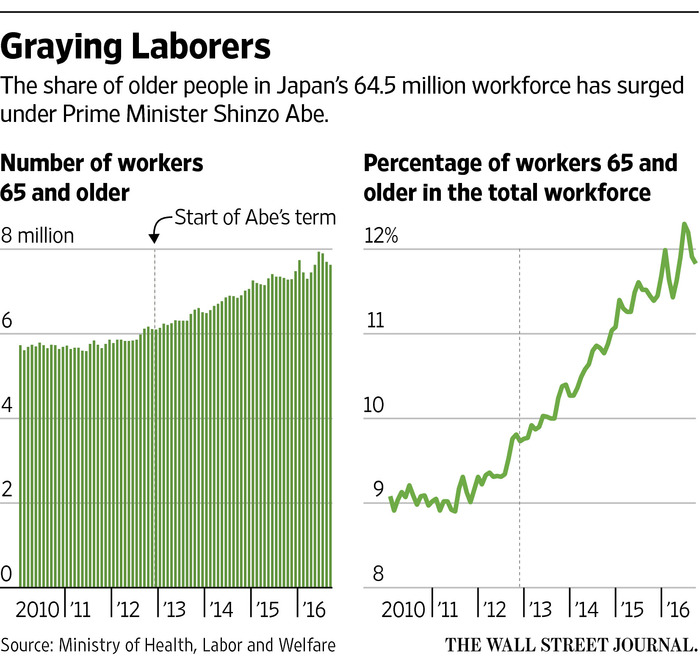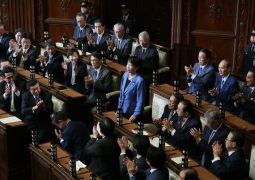Numbers of Japanese Elders in Workforce Soar

TOKYO—For a glimpse of what happens when an aging nation runs short of workers, consider Takashi Abe. The 77-year-old former masseur was looking for a job close to home when his wife became ill. He landed a gig as a parking-lot guard helping direct traffic.
“There was no age limit,” he says. “If you’re healthy, you can work.”
The job requires Mr. Abe to be on his feet for hours directing cars, no matter the weather. Until recently, it would have been a job for someone younger, but with a tight labor market, employers are turning to older people to fill the gap.
Despite Japan’s reputation for economic sluggishness, Tokyo is flooded with help-wanted signs. The unemployment rate has fallen to 3%, and on Tuesday the government said the number of unemployed people fell below two million for the first time since 1995. It also said there are 140 jobs for every 100 people looking for work, the highest level in a quarter-century.
If the economy expands in the current quarter, as economists expect, it would be the longest growth stretch in six years.
The growth is still sluggish, less than 1% expected this year. But it is enough to create a worker shortage because Japan’s working-age population has been falling since the late 1990s due to the nation’s low birthrate. The government hasn’t allowed large-scale immigration to make up for the decline. With companies desperate for help, the number of employed Japanese people 65 or older has risen by 33% in the past five years.
Those are welcome figures for Prime Minister Shinzo Abe, who has sought to boost the economy by raising the workforce participation of groups like women and seniors—who now represent more than a quarter of the population. The labor crunch lets young people be picky, however, leaving senior citizens to pick up the slack in less glamorous jobs.
“Our biggest problem is that there aren’t enough people. We aren’t an attractive industry,” says Fumihiko Nakata, president of Japan Security Patrols, a Tokyo company that provides guard staff for large construction sites. “Young people who work in this industry find it hard to have dreams for a future.”
Executives in the trucking and construction industries also say the percentage of workers over 65 has increased as young people shy away from demanding jobs that tend to offer lower wages and benefits.
Many older workers end up in these jobs because they are pushed out of their roles in larger companies after they turn 60. The law requires that companies ensure workers a job until 65, but not necessarily at the same wages or with the same duties.
In a survey of 5,000 people in their 60s last year by the government-affiliated Japan Institute for Labor Policy and Training, more than a third of respondents said their responsibilities changed when they continued working after reaching retirement age, and about 80% said they took a pay cut to continue working. Recruit Works Institute, a research unit of personnel company Recruit Holdings Co., says average annual pay for men in their early 60s is a third lower than for those in their late 50s at companies with more than 1,000 workers.
 ENLARGE
ENLARGEWhen Hideo Hashimoto turned 60, the large dairy company where he worked as a researcher offered to let him stay for four more years with less responsibility and less pay. Instead, he struck out on his own and now works part time as an adviser for a small water-treatment company in Yokohama, Hinode Sangyo Co.
“Even though my work now isn’t completely related to what I did before, I can use my skills,” he said. “It’s fun.”
Hinode Sangyo director Kaori Fujita said hiring older workers allows a small company like hers to attract talent from bigger companies. On the flip side, she worries about finding younger workers to whom Mr. Hashimoto and Mr. Kurita can pass their knowledge.
“We need to be balanced” in the age mix of employees, she said. “But it is hard to find young people to work at a small company.”
Write to Eleanor Warnock at eleanor.warnock@wsj.com
- Previous China’s New Tool for Social Control: A Credit Rating for Everything
- Next Saudi Sovereign Wealth Fund to Invest in Alabbar-Led Company Public Investment Fund to buy 50% stake in Adeptio AD led by Emirati businessman















